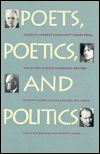

 |

|

The average rating for Poets,Poetics,and Politics: America's Literary Community Viewed from the Letters of Rolfe Humphries,1910-1969 based on 2 reviews is 3 stars.
Review # 1 was written on 2013-01-05 00:00:00 Steve Velner Steve VelnerRolfe Humphries was my Freshman Humanities professor at Amherst College; he encouraged me in many ways, loaning me Seneca (Thyestes and one other) from his extensive shelves of Loeb in his office down the hall from our classroom. He also chose me and a classmate who would eventually graduate third in our class for a special evening weekly Humanities course with classicists and others. He was less impressed with my verse, but he commented on it with attention even after he moved to Dartmouth and San Francisco. (He also commented on Dartmouth, but mum is the word.) His comments on Virgil's Aeneid, one of our course readings, included: "Here the translator has taken liberties. Timeo Danaos, et dona ferentis. Strictly...." Of course, he himself was the translator he criticized. I read his letters with interest, and the biographical intro by Ruth Limmer is revealing. He came under heavy fire during my years at Amherst; students all wanted a "famous poet," not realizing that they had one, one who was perhaps sidetracked by Roethke, unfortunately, because it can be argued that Roethke authored about seven fine poems. But like Robert Herrick, perhaps the best Latin translator in English (Jonson aside) Humphries wrote translations with such ease one forgets Vergil and Juvenal and Martial had no idea of the English language, which they would have considered a barbaric-sounding Northern brutality. |
Review # 2 was written on 2008-07-19 00:00:00 Banan Rama Banan RamaBehold, unwrap the highest genius. Like Keats alone among poets, Dickinson's letters exhibit that genius. In fact, she compares winter to, " Keats's bird, 'who hops and hops in little journeys.'" Andrew Marvell's letters, for instance, are humdrum affairs mostly written in his public voice as parliamentary representative. ED writes with her poet's ear, "Friends are gems--infrequent" (II.352, 1859). Or, check this sentiment which would compound among moderns (even inaugural poets): "I have heard many notedly Bad readers, and a fine one would be almost a fairy surprise" (II.345, Jan '59). Her verses punctuate her letters, letters which are often as epigrammatic as her verse; in her last year, "Fear makes us all martial." Apply that to the gun promoters today. One two month visit to the UK for research, I would read a paragraph in Gilbert White every day, as a Naturalist's Bible. Decades earlier, I did the same with Dickinson's letters. One can open them at random, and find within a page or two something unprecedented and yet familiar, like this today. After telling Loo (L Norcross) about the vegetable she sent, to be eaten with mustard, she observes: "I enjoy much with a precious fly, during sister's absence, not one of your blue monsters, but a timid creature, that hops from pane to pane of her white house, so very cheerfully, and hums and thrums, a sort of speck piano." Then she adds, almost as surprisingly, "Tell Vinnie I'll kill him the day she comes, for I sha'n't need him any more, and she don't mind flies" we'd say, she Does mind them (II.353). There are revelations about her famous personal avoidance of others; from the friends/gems letter to Loo, she confides, "For you remember, dear, you are one of the ones from whom I do not run away! I keep an ottoman in my heart exclusively for you." And she reveals with profundity some of her avoidance: "My own words so burn and chill me that the temperature of other minds is too new an awe" (to Chickering, 1883). Her epistolary attentions range far, including of course, her assessment of the form in which she writes," A letter always seemed to me like Immortality, for is it not the mind alone, without corporeal friend?" (1882). And she even appears to have said, like the Reformation martyrs, her own last words, but in a letter: "Little Cousins, Called back." Here she immortalizes a book title (by one Conway) she had read, so her last words are also a literary allusion. |
CAN'T FIND WHAT YOU'RE LOOKING FOR? CLICK HERE!!!